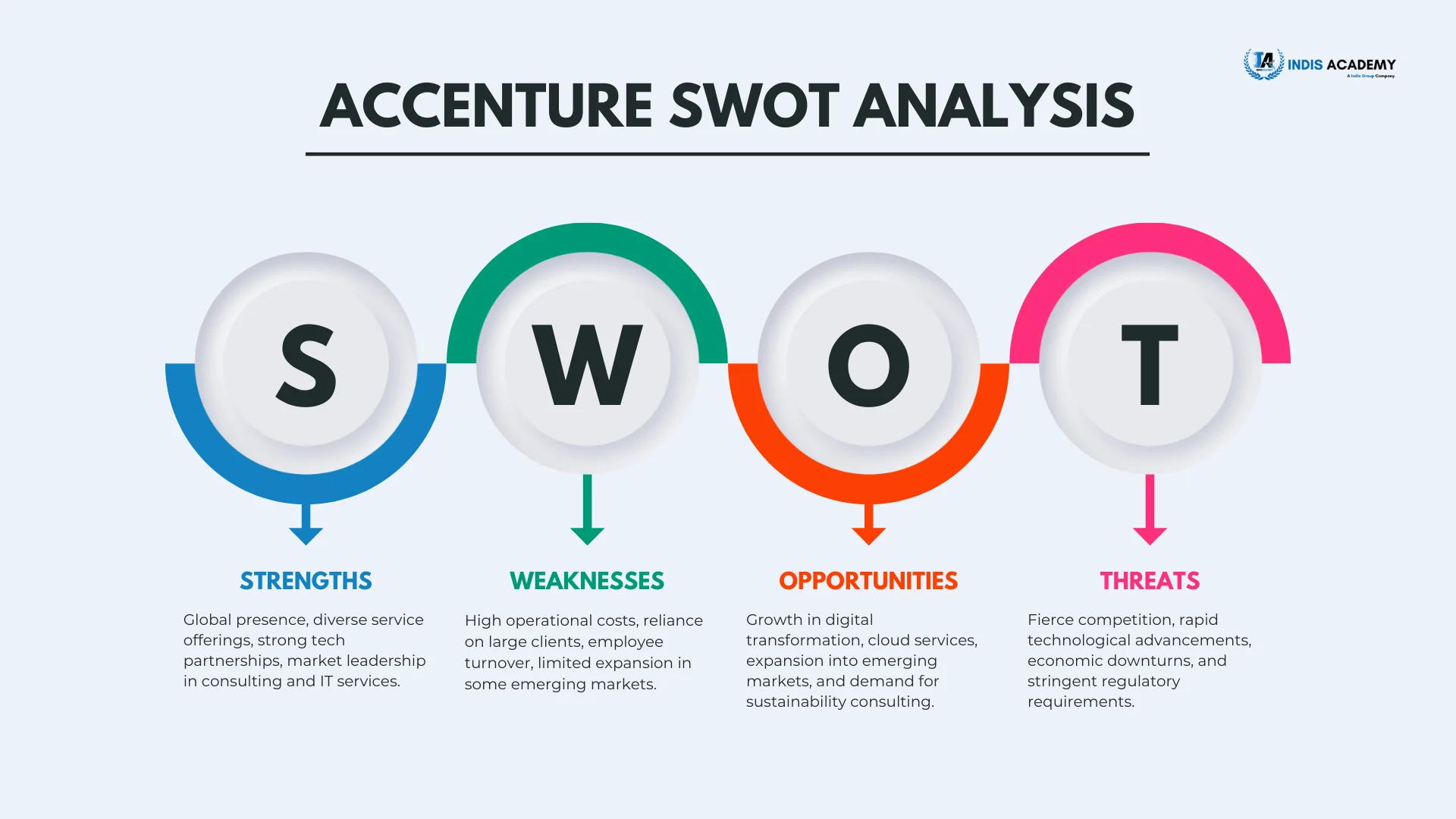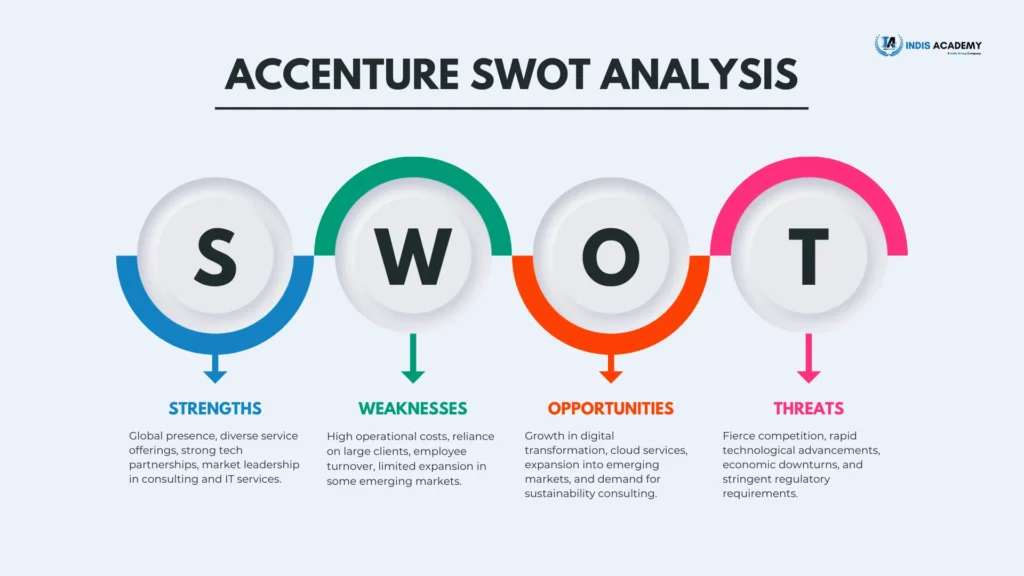When we think of global giants in the consulting and technology space, Accenture often comes to mind, doesn’t it? With its footprint spread across more than 120 countries, Accenture is a name that resonates with innovation, strategy, and cutting-edge solutions. But what really makes Accenture tick?
What strengths fuel its success, and what weaknesses could potentially trip it up? How does it navigate the complex and ever-changing world of business, and what opportunities does it seize to stay ahead?
Most importantly, are there any looming threats that could challenge its dominance? This is where a SWOT analysis comes into play, offering a deep dive into the core of Accenture’s business strategies.
In this article, we’re going to unravel the intricacies of Accenture’s Strengths, Weaknesses, Opportunities, and Threats, painting a detailed picture of where the company stands today and where it might be headed tomorrow.
So, whether you’re a business enthusiast, a competitor, or just someone curious about how a powerhouse like Accenture operates, stick around—we’re about to embark on an insightful journey through the very fabric of Accenture’s global presence.
In-Depth Accenture SWOT Analysis
Now that we’ve set the stage, let’s dive into an in-depth SWOT analysis of Accenture. Understanding the nuances of its strengths, such as its extensive global reach and diverse service offerings, helps us grasp why Accenture remains a leader in the industry.
On the flip side, we’ll explore its weaknesses, like potential over-reliance on certain markets or clients.
We’ll also uncover the opportunities that Accenture is poised to seize, from emerging technologies to expanding markets, and identify the threats that could disrupt its growth. This detailed analysis will provide a comprehensive view of Accenture’s strategic position.
| Category | Details |
|---|---|
| Founded | 1989 |
| Headquarters | Dublin, Ireland |
| Global Presence | Operates in over 120 countries |
| Number of Employees | Over 700,000 employees worldwide |
| Annual Revenue | Approximately $64 billion (2023) |
| Key Industries | Technology, Consulting, Strategy, Digital, Operations, and Managed Services |
| Major Clients | Fortune 500 companies across industries like finance, healthcare, technology, and government |
| Market Position | Ranked as one of the top global consulting and professional services firms |
| Innovation Focus | AI, Cloud, Cybersecurity, Digital Transformation, Blockchain |
| Competitors | IBM, Deloitte, PwC, Capgemini, and KPMG |

Accenture Products & Competitors
Accenture offers a wide range of services that cater to various industries, focusing primarily on consulting, technology, and outsourcing.
Their key products and services include digital transformation, cloud services, cybersecurity solutions, AI and analytics, and supply chain management. Accenture’s innovation-led approach allows it to deliver customized solutions that drive efficiency and growth for its clients.
However, the competitive landscape is fierce, with major players like IBM, Deloitte, PwC, Capgemini, and KPMG vying for market share in similar domains. These competitors offer overlapping services, making the market highly competitive, and challenging Accenture to continuously innovate and differentiate itself.
| Category | Details |
|---|---|
| Key Products/Services | Digital Transformation, Cloud Services, Cybersecurity, AI & Analytics, Outsourcing |
| Primary Competitors | IBM, Deloitte, PwC, Capgemini, KPMG |
| Market Share (2023) | Approx. 12% of the global consulting and IT services market |
| Revenue Growth Rate | 9% year-over-year growth in 2023 |
| Innovation Investment | Over $2 billion annually in R&D and innovation |
Complete Accenture SWOT Analysis
Strengths
- Global Presence:
Accenture operates in over 120 countries, providing a significant advantage in reaching diverse markets and clients. Its vast global network enables it to offer localized solutions while maintaining a consistent standard of excellence across different regions. - Innovation Leadership:
The company invests heavily in emerging technologies like AI, blockchain, and cloud computing, which keeps it at the forefront of digital transformation. This continuous focus on innovation allows Accenture to deliver cutting-edge solutions that meet the evolving needs of its clients. - Diverse Service Portfolio:
Accenture offers a broad range of services, including consulting, strategy, technology, and operations. This comprehensive service lineup makes Accenture a preferred partner for many organizations, allowing it to build long-term, integrated client relationships. - Strong Brand Recognition:
Consistently ranked among the top global consulting firms, Accenture’s brand is synonymous with quality and reliability. This strong brand presence helps attract top-tier clients and talent. - Skilled Workforce:
Accenture’s ability to attract and retain top talent is a crucial strength. A highly skilled and innovative workforce is essential for maintaining its competitive edge and delivering high-quality services.
Weaknesses
- Client Dependence:
A significant portion of Accenture’s revenue comes from a few key clients and industries. This reliance on specific sectors makes the company vulnerable to industry downturns or shifts in client needs. - Complex Organizational Structure:
Due to its large size and global reach, Accenture can sometimes suffer from bureaucratic processes and slower decision-making. This can hinder its ability to remain agile and quickly adapt to market changes. - Talent Retention Challenges:
In a highly competitive industry, retaining top talent is a constant challenge. High turnover rates or an inability to attract the best professionals could weaken Accenture’s service delivery and innovation capacity. - Geopolitical and Regulatory Risks:
Operating in multiple countries exposes Accenture to various geopolitical and regulatory challenges. Changes in trade policies, local regulations, or political instability in key markets could negatively impact its operations. - High Operational Costs:
Maintaining a global presence and investing in continuous innovation requires significant resources. High operational costs could impact profitability, especially in a highly competitive market.
Opportunities
- Digital Transformation Demand:
The growing need for digital transformation across all industries presents a massive opportunity for Accenture. With its expertise in AI, cloud computing, and data analytics, Accenture is well-positioned to help businesses navigate this shift. - Expansion in Emerging Markets:
Rapid economic growth in emerging markets like Asia, Africa, and Latin America offers new opportunities for Accenture to expand its footprint and tap into these growing economies. - Cybersecurity Services:
With the increasing importance of cybersecurity, there is a rising demand for advanced security solutions. Accenture’s robust cybersecurity offerings position it to capitalize on this growing market. - Sustainability Initiatives:
As businesses worldwide focus more on sustainability, Accenture’s investment in green technologies and sustainable solutions offers a key growth area. Helping clients reduce their carbon footprint aligns with market trends and creates new business opportunities. - Acquisitions and Partnerships:
Strategic acquisitions and partnerships can further enhance Accenture’s capabilities and market reach. By acquiring innovative firms or forming alliances, Accenture can continue to expand its service offerings and market presence.
Threats
- Rapid Technological Changes:
The fast pace of technological advancements poses a significant threat. If Accenture fails to keep up with emerging technologies or misjudges industry trends, it could lose its competitive edge. - Intense Competition:
Accenture faces fierce competition from other global consulting firms like IBM, Deloitte, PwC, and Capgemini. These competitors are equally focused on innovation and expanding their service offerings, which could erode Accenture’s market share. - Talent War:
The ongoing competition for skilled professionals in the tech industry is a critical threat. Difficulty in attracting and retaining top talent could impact Accenture’s ability to deliver high-quality services and innovate. - Economic and Geopolitical Instability:
Economic recessions, trade wars, and geopolitical tensions could disrupt Accenture’s global operations. Such uncertainties can lead to reduced client spending and affect overall business performance. - Data Security and Privacy Concerns:
As cyberattacks become more sophisticated, the risk of a significant data breach grows. A security breach could damage Accenture’s reputation, lead to loss of client trust, and result in financial and legal repercussions.
Conclusion: Accenture SWOT Analysis
In summary, Accenture stands as a formidable force in the global consulting and technology landscape, leveraging its strengths such as a vast global presence, innovation-driven approach, and a diverse service portfolio to maintain its leadership position. However, the company is not without its challenges.
Dependence on key clients, the complexity of its organizational structure, and the ongoing war for top talent present vulnerabilities that Accenture must carefully manage. Despite these weaknesses, the opportunities ahead are abundant.
The increasing demand for digital transformation, expansion into emerging markets, and the growing focus on cybersecurity and sustainability offer significant growth potential for Accenture.
Yet, the company must remain vigilant against external threats like rapid technological changes, intense competition, and economic uncertainties.
By continuing to innovate, adapt to market shifts, and strategically invest in emerging areas, Accenture can not only overcome these challenges but also strengthen its market position.
As it navigates this complex landscape, Accenture’s ability to balance its strengths with the demands of an ever-evolving industry will be key to sustaining its success and driving future growth.
The road ahead is filled with both challenges and opportunities, and how Accenture manages these will define its trajectory in the years to come.
Read More:











